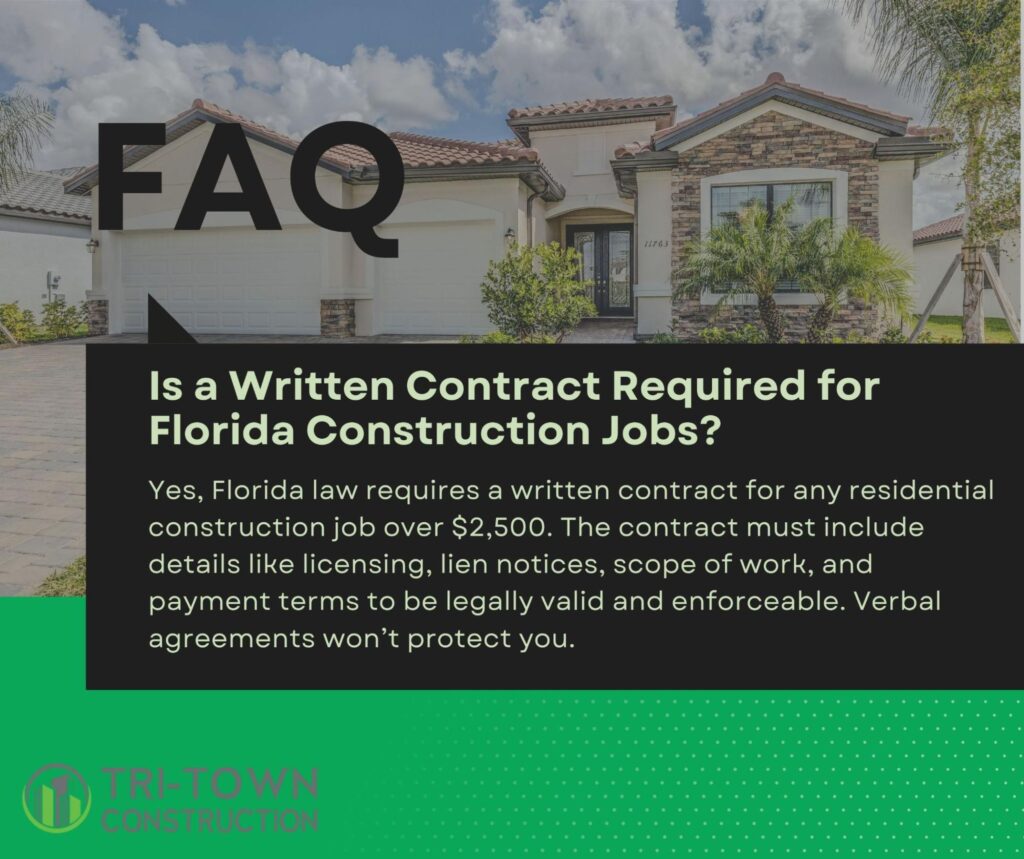A construction contract in Florida legally protects both homeowners and contractors by outlining scope, costs, timelines, and responsibilities, and it’s required for residential jobs over $2,500.
Florida Construction Contracts: What to Include and Why They Matter

Whether you’re building a home or remodeling one, your construction contract is the single most important document in the project.
In Florida, it must follow specific legal requirements to be valid, and skipping key elements could cost you both time and money. Here’s what matters most:
- You must have a written contract if the job exceeds $2,500
- Hiring an unlicensed contractor can void your contract
- The contract must include lien notices, licensing info, and insurance terms
- Clear draw schedules, change order terms, and material allowances are essential
- Even small mistakes, like skipping a lien release, can lead to property liens or lawsuits
- Cost-plus and lump sum contracts serve different needs; choose based on scope clarity and risk tolerance
A strong contract prevents disputes and protects your investment, especially in complex or storm recovery projects.
Keep reading to explore the contract types, required clauses, and mistakes you don’t want to make.
Why Construction Contracts Matter in Florida

In Florida, a construction contract is more than paperwork, it’s your legal protection.
Be it remodeling or building new, the right contract lays the groundwork for costs, responsibilities, and how problems are resolved.
1. The Need For a Written Contract
For any residential project over $2,500, Florida law requires a written contract. It’s not optional.
A written agreement protects both parties, triggers important legal rights, and gives homeowners a clear path if things go wrong.
2. What If the Contractor Isn’t Licensed
Hiring an unlicensed contractor can void your contract entirely.
If the job fails or goes unfinished, you may have no legal way to recover your losses, and no access to Florida’s Construction Recovery Fund.
In some cases, homeowners can even be fined.
3. Key Clauses Every Contract Needs
Florida Statutes §489 and §713 require important contract elements:
- The contractor’s DBPR license number
- A lien warning that protects subcontractors and suppliers
- A clause giving the contractor a chance to fix issues before legal action
Without these, your contract may not hold up in court.
4. Verbal Agreements Can Cost You
Verbal deals leave too much open to interpretation.
Homeowners have been hit with liens after paying in full, just because a contractor failed to pay others. If it’s not in writing, you may have no proof of what was agreed.
Understanding the legal weight of your construction contract is step one. Next, let’s look at the two main types of contracts used across Florida, and how they impact your build.
Lump Sum vs. Cost-Plus: Choosing the Right Contract for Your Florida Build
View this post on Instagram
Every construction project comes with its own set of variables.
Choosing the right contract type depends on how much you know about the scope, and how much risk you’re willing to take on.
Let’s break down the two most common options in Florida.
1. Lump Sum Contracts: Fixed Scope, Fixed Price
This contract sets a single total price based on clearly defined work. It’s ideal when plans and specs are finalized.
- The contractor takes on pricing risk
- Homeowners get upfront cost certainty
- Changes require formal change orders
- Accuracy in the initial estimate is key
This structure works best when nothing major is expected to change.
Perfect For: Projects with clear plans, like new builds or kitchen remodels with few surprises.
2. Cost-Plus Contracts: Flexible Scope, Transparent Pricing
In a cost-plus contract, you pay the actual costs plus a pre-agreed markup. It’s ideal when the project scope has unknowns.
- Full transparency into material and labor costs
- Markup varies, lower for large jobs, higher for small ones
- Great for complex or storm-damaged structures
- Homeowners carry financial risk if costs increase
This model supports collaboration but requires trust and oversight.
Perfect For: Renovations, hurricane rebuilds, or jobs where surprises are likely once the work begins.
Now that you’ve seen the two main types, let’s explore a few lesser-known contracts that might suit unique Florida builds.
Helpful Resource → 2,000 ft² House Avg Cost in FL | Location. Location. Location
Beyond the Basics: Two More Contracts You Should Know About
View this post on Instagram
While lump sum and cost-plus contracts cover most residential projects, there are other formats worth knowing, especially if you’re planning a custom build or large-scale renovation.
These lesser-known contracts offer unique advantages when speed, collaboration, or complexity come into play.
1. Design-Build Contracts: One Team, One Agreement
With design-build, one company manages both the design and construction phases. This creates a streamlined process and reduces the risk of miscommunication.
- Faster project timelines and fewer delays
- One point of accountability for design errors
- Often more cost-efficient with modular or ICF homes
- Simplifies communication throughout the build
It’s a great option when you want one team to manage it all.
Perfect For: Custom homes, modular builds, or flood-resistant designs needing coordination from day one.
2. Integrated Project Delivery (IPD): Shared Goals, Shared Responsibility
IPD aligns the contractor, architect, and owner under a shared agreement. Everyone collaborates closely and shares risks and rewards.
- Early involvement from all key players
- Encourages cost-saving ideas and better efficiency
- Reduces change orders and disputes
- Ideal for high-end or technically complex projects
It’s a team-first approach that’s gaining ground in Florida’s luxury build market.
Perfect For: High-end homes, multi-phase projects, or anything requiring deep coordination and transparency.
Now that we’ve covered the contract types, let’s break down what every Florida construction contract should actually include, no matter which type you choose.
Helpful Resource → Home Addition Costs in Florida (2025)
What Every Florida Construction Contract Should Include, No Exceptions

No matter which contract type you choose, what’s written inside it is what truly protects you.
A well-crafted construction contract in Florida isn’t just about cost, it’s about covering all the legal, financial, and practical details that prevent problems down the road.
1. License and Job Details That Set the Foundation
Every contract should include the contractor’s active DBPR license number.
It must also clearly state the legal property description and a specific scope of work. Vague terms like “remodel kitchen” won’t hold up if disputes arise.
2. Pricing, Draws, and Allowances
Total project cost should be clearly listed along with a draw schedule tied to milestones, not arbitrary dates.
Include allowance breakdowns for items like tile, fixtures, and appliances so you’re not hit with unexpected upgrades later.
3. Insurance and Risk Protection
Your contract should require proof of general liability and builder’s risk insurance. This protects both parties in case of accidents, property damage, or theft during the build.
4. Lien Notices, Release Procedures, and Cure Clauses
Contracts must disclose mechanics lien laws and the Florida Homeowner Construction Recovery Fund.
Just as important, require signed lien releases from subcontractors at each payment draw. And don’t forget the “opportunity to cure” clause, which gives your contractor a chance to fix issues before litigation.
Getting the contract right is only half the battle. Next, let’s look at the common mistakes homeowners make, and how to avoid them.
Helpful Resource → Florida Remodeling License Requirements Explained
Common Contract Mistakes That Could Wreck Your Project (And Your Wallet)
View this post on Instagram
Even with a contract in place, costly problems can sneak in through vague language or overlooked details.
These missteps often lead to delays, budget blowouts, or even legal disputes, especially when timelines get pushed or materials don’t match expectations.
Mistake #1: Skipping Lien Releases
If you’re paying draws without collecting lien releases from subcontractors and suppliers, you’re putting your property at risk. Even if you pay the general contractor, others can still place a lien if they’re unpaid.
Mistake #2: Undefined Draw Schedules
Draw schedules tied to arbitrary dates, or no schedule at all, leave room for payment issues and disputes. Payments should be based on completed milestones, not calendar weeks.
Mistake #3: Vague or Missing Timelines
A contract without a defined start date, end date, or timeline benchmarks gives no accountability. This is a major reason projects drag on for months without progress.
Mistake #4: Poor Change Order Language
Accepting verbal changes or failing to document material substitutions can lead to misunderstandings.
If your contractor installs a cheaper or different material than expected, your contract must give you approval rights.
Mistake #5: Not Reviewing the Fine Print
Clauses like “pay-if-paid” or unclear allowance terms can shift financial risk to you. And if your contractor isn’t licensed for the type of work you’re doing, that could void your contract entirely.
Pro tip: A detailed review by a construction attorney upfront is often far cheaper than litigation after the fact.
With the right contract and a clear understanding of what to avoid, you’re better prepared to start your project with confidence.
Build Smarter: Let Your Contract Work for You
A Florida construction contract isn’t just a set of signatures, it’s your protection, your playbook, and your peace of mind.
Whether you’re building from the ground up, tackling a remodel, or recovering after a storm, a strong contract helps prevent costly surprises and delays.
The key is understanding what to include, which structure fits your project, and how to avoid common pitfalls before they spiral into problems.
Every successful build starts with clarity, and that begins on paper.

At Tri-Town Construction, we believe a contract should protect the homeowner first.
We craft every agreement with transparency, legal compliance, and clear language that puts your interests at the forefront.
If you’re planning a project in Southwest Florida and want to build with confidence, we’re here to help you do it right from day one.
Let’s rebuild smarter, together.
